In March we decided to create a mud kitchen space where our vegetable garden was situated, with the intention of creating a new garden space or spaces. As a team we began brain storming ideas on where we could create a new vegetable garden within our outside environment.
"Gardens and children need the same things - patience, love and someone who will never give up on them." -Nicolette Sowder
It was now time to add some vegetable plants. We had fun researching with the tamariki, discovering what vegetable plants we could plant for the month and then had even more fun planting them. We also sourced information from whānau who shared their passion for gardening.
The tamariki took turns watering and taking care of our vegetable plants, checking for bugs and new growth. This soon became a daily ritual. During this process the tamariki began to develop a real sense of ownership and a passion for looking after the environment.
One of the kaupapa of te Tiriti o Waitangi is kaitiakitanga, meaning protection, guardianship and and preservation. It is a way of respecting and caring for the environment, based on a traditional Māori worldview.
"Kaiako support mokopuna to engage respectfully with, and to have aroha for, Papatūānuku. They encourage an understanding of kaitiakitanga and the responsibilities of being a kaitiaki by, for example, caring for rivers, native forest, and birds" (Te Whāriki, page 33).
Kaitiakitanga is based on traditional Māori views and incorporates a strong connection between spirituality, people, and the natural world. Māori believe that the tangata whenua/people of the land, have a responsibility towards the protection or guardianship of Papatūānuku. The basic meaning of ‘tiaki’ is to guard, but depending on the context in which it is used, it also means to preserve, keep, conserve, nurture, protect and watch over. The prefix ‘kai’ with the verb ‘tiaki’ denotes the agent of the action of ‘tiaki’. Therefore, a kaitiaki is a guardian, keeper, preserver, conservator or protector. The addition of ‘tanga’ denotes preservation, conservation and protection."
https://www.sciencelearn.org.nz/resources/2544-understanding-kaitiakitanga
In September we decided to register for 'Keep New Zealand Beautiful' week. During this week tamariki went on an excursion, cleaning up our local streets. We then sorted the rubbish into categories. This experience supported tamariki, whānau, and kaiako to develop the attitudes and dispositions to think and act as kaitiaki within our community.
Throughout this process tamariki are learning where food comes from. It helps them connect with nature and supports wonder, curiosity, patience, fine motor skills, thinking and communication skills, while also providing opportunities to work with and alongside others.
"There are
no gardening mistakes, only experiments," -Janet Kilburn Phillips
https://littlesproutslearning.co/benefits-of-gardening-in-early-childhood-settings/
It was now time to replant and the process began again.
"Tell me
and I'll forget. Teach me and I'll remember. Involve me and I'll learn." -
Benjamin Franklin
Now with all our seedlings sprouting we are now finding alternative
spaces to expand and create more vegetable gardens.
Our end of year gift for whānau which began last year is 'potatoes in a
bucket'. We have been busy getting these ready and tamariki have been able to
use their skills and knowledge learnt over our many gardening projects
throughout this time. Planted with aroha and manaaki we hope that this small offering brings a sense of kotahitanga.
We plan on expanding our gardens next year and we can't wait to share
this process with you all.
Ko te whenua te waiu mo nga uri whakatipu-
The land will provide sustenance for future generations
Nga mihi
Emma Quigg







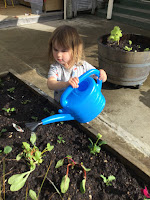






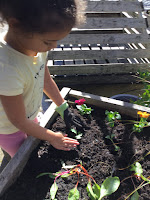





























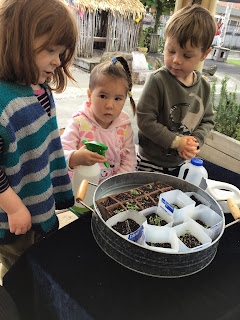




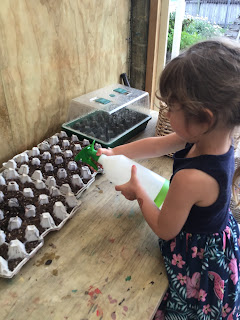


























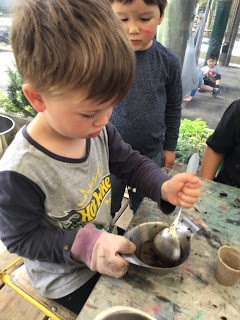










.JPG)











No comments:
Post a Comment